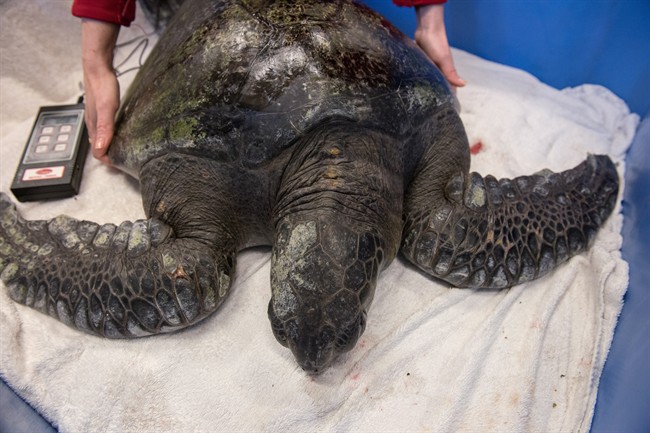VANCOUVER – The head veterinarian at Vancouver’s aquarium says the warm currents of El Nino may be behind the recent strandings of two animals rarely seen in Canadian waters.

A green sea turtle was rescued from a beach on Vancouver Island’s Pacific Rim National Park on Saturday and a male Guadalupe fur seal was rescued from the same park last Thursday.
These kind of strandings often increase in El Nino years when water is warmer off British Columbia, said Dr. Martin Haulena.
“Changing water temperatures, changing currents, that’s kind of the prime suspect,” he said.
It’s unusual to spot a green sea turtle in Canadian waters, and Haulena said he believes this is the first time a fur seal has ever been stranded in B.C.
The rescued animals were taken to the Vancouver Aquarium’s Marine Mammal Rescue Centre, where the seal is being treated for starvation and dehydration, while the turtle was hypothermic and has wounds to its shell.
“Both animals share the same clinical signs in that they are very weak, very slow, very lethargic and can’t swim very well on their own,” said the veterinarian.

Get daily National news
Guadalupe fur seals generally live off of the coast of California and on Mexico’s Guadalupe Island, and are listed as a threatened species in the U.S.
Warm waters likely forced the seal to seek colder and colder waters to hunt, Haulena said.
“I’m quite worried about the seal,” he said, adding that fur seals often don’t survive when they become stranded.
- Woman with blood disorder finds B.C. is only province not to cover ‘life-changing’ drug
- Vancouver council approves DTES changes for safer, more dignified housing
- Atmospheric river causes Coquihalla River to cut right through Hope golf course
- B.C. premier paints rosy picture for economy heading in to 2026
The young male has been given fluids and antibiotics, but is not eating on his own and the veterinary team isn’t sure if he has any other injuries or illnesses in addition to starvation.
The prognosis is better for the turtle, Haulena said.
Green sea turtles are listed as endangered world wide and are usually in the waters of Mexico and Hawaii.
The animals are dependent on external conditions for their body temperature.
“Whatever the temperature around them is, that’s what their temperature is,” Haulena explained. “So as they get caught in these currents that are travelling into colder and colder water, they themselves get colder and colder.”
The turtle had a body temperature of 11.2 degrees Celsius when it was brought in, far below the normal body temperature of about 20 degrees Celsius.
The care team is slowly warming the turtle by one to two degrees Celsius per day by simply turning up the thermostat, and the animal has begun to respond to treatment, Haulena said.







Comments